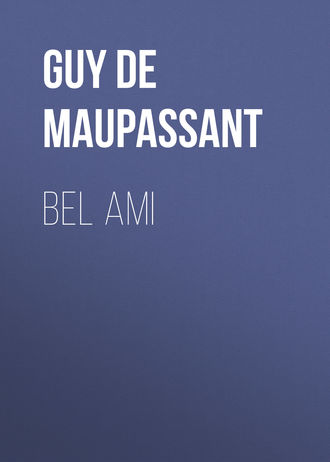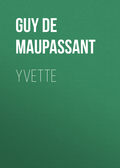
Ги де Мопассан
Bel Ami
George replied: "Do not trouble yourself, he knows what to do."
He had given the man his address in the Rue de Constantinople.
She resumed: "You cannot imagine what I suffer on account of you, how I am tortured and tormented. Yesterday, in the church, I was cruel, but I wanted to flee from you at any cost. I was so afraid to find myself alone with you. Have you forgiven me?"
He squeezed her hands: "Yes, yes, what would I not forgive you, loving you as I do?"
She looked at him with a supplicating air: "Listen, you must promise to respect me – not to – not to – otherwise I cannot see you again."
He did not reply at once; he wore under his moustache that keen smile that disturbed women. He ended by murmuring: "I am your slave."
Then she began to tell him how she had perceived that she was in love with him on learning that he was going to marry Madeleine Forestier. She gave details, little details of dates and the like. Suddenly she paused. The cab had stopped. Du Roy opened the door.
"Where are we?" she asked.
"Get out and come into this house," he replied. "We shall be more at ease there."
"But where are we?"
"At my rooms," and here we will leave them to their tête-à-tête.
XIII
Autumn had come. The Du Roys had passed the whole of the summer in Paris, carrying on a vigorous campaign in the Vie Francaise during the short vacation of the deputies.
Although it was only the beginning of October, the Chambers were about to resume their sittings, for matters as regarded Morocco were becoming threatening. No one at the bottom believed in an expedition against Tangiers, although on the day of the prorogation of the Chamber, a deputy of the Right, Count de Lambert-Serrazin, in a witty speech, applauded even by the Center had offered to stake his moustache, after the example of a celebrated Viceroy of the Indies, against the whiskers of the President of the Council, that the new Cabinet could not help imitating the old one, and sending an army to Tangiers, as a pendant to that of Tunis, out of love of symmetry, as one puts two vases on a fireplace.
He had added: "Africa is indeed, a fireplace for France, gentleman – a fireplace which consumes our best wood; a fireplace with a strong draught, which is lit with bank notes. You have had the artistic fancy of ornamenting the left-hand corner with a Tunisian knick-knack which had cost you dear. You will see that Monsieur Marrot will want to imitate his predecessor, and ornament the right-hand corner with one from Morocco."
This speech, which became famous, served as a peg for Du Roy for a half a score of articles upon the Algerian colony – indeed, for the entire series broken short off after his début on the paper. He had energetically supported the notion of a military expedition, although convinced that it would not take place. He had struck the chord of patriotism, and bombarded Spain with the entire arsenal of contemptuous arguments which we make use of against nations whose interests are contrary to our own. The Vie Francaise had gained considerable importance through its own connection with the party in office. It published political intelligence in advance of the most important papers, and hinted discreetly the intentions of its friends the Ministry, so that all the papers of Paris and the provinces took their news from it. It was quoted and feared, and people began to respect it. It was no longer the suspicious organ of a knot of political jugglers, but the acknowledged one of the Cabinet. Laroche-Mathieu was the soul of the paper, and Du Roy his mouthpiece. Daddy Walter, a silent member and a crafty manager, knowing when to keep in the background, was busying himself on the quiet, it is said, with an extensive transaction with some copper mines in Morocco.
Madeleine's drawing-room had been an influential center, in which several members of the Cabinet met every week. The President of the Council had even dined twice at her house, and the wives of the statesmen who had formerly hesitated to cross her threshold now boasted of being her friends, and paid her more visits than were returned by her. The Minister for Foreign Affairs reigned almost as a master in the household. He called at all hours, bringing dispatches, news, items of information, which he dictated either to the husband or the wife, as if they had been his secretaries.
When Du Roy, after the minister's departure, found himself alone with Madeleine, he would break out in a menacing tone with bitter insinuations against the goings-on of this commonplace parvenu.
But she would shrug her shoulders contemptuously, repeating: "Do as much as he has done yourself. Become a minister, and you can have your own way. Till then, hold your tongue."
He twirled his moustache, looking at her askance: "People do not know of what I am capable," he said, "They will learn it, perhaps, some day."
She replied, philosophically: "Who lives long enough will see it."
The morning on which the Chambers reassembled the young wife, still in bed, was giving a thousand recommendations to her husband, who was dressing himself in order to lunch with M. Laroche-Mathieu, and receive his instructions prior to the sitting for the next day's political leader in the Vie Francaise, this leader being meant to be a kind of semi-official declaration of the real objects of the Cabinet.
Madeleine was saying: "Above all, do not forget to ask him whether General Belloncle is to be sent to Oran, as has been reported. That would mean a great deal."
George replied irritably: "But I know just as well as you what I have to do. Spare me your preaching."
She answered quietly: "My dear, you always forget half the commissions I entrust you with for the minister."
He growled: "He worries me to death, that minister of yours. He is a nincompoop."
She remarked quietly: "He is no more my minister than he is yours. He is more useful to you than to me."
He turned half round towards her, saying, sneeringly: "I beg your pardon, but he does not pay court to me."
She observed slowly: "Nor to me either; but he is making our fortune."
He was silent for a few moments, and then resumed: "If I had to make a choice among your admirers, I should still prefer that old fossil De Vaudrec. What has become of him, I have not seen him for a week?"
"He is unwell," replied she, unmoved. "He wrote to me that he was even obliged to keep his bed from an attack of gout. You ought to call and ask how he is. You know he likes you very well, and it would please him."
George said: "Yes, certainly; I will go some time to-day."
He had finished his toilet, and, hat on head, glanced at himself in the glass to see if he had neglected anything. Finding nothing, he came up to the bed and kissed his wife on the forehead, saying: "Good-bye, dear, I shall not be in before seven o'clock at the earliest."
And he went out. Monsieur Laroche-Mathieu was awaiting him, for he was lunching at ten o'clock that morning, the Council having to meet at noon, before the opening of Parliament. As soon as they were seated at table alone with the minister's private secretary, for Madame Laroche-Mathieu had been unwilling to change her own meal times, Du Roy spoke of his article, sketched out the line he proposed to take, consulting notes scribbled on visiting cards, and when he had finished, said: "Is there anything you think should be modified, my dear minister?"
"Very little, my dear fellow. You are perhaps a trifle too strongly affirmative as regards the Morocco business. Speak of the expedition as if it were going to take place; but, at the same time, letting it be understood that it will not take place, and that you do not believe in it in the least in the world. Write in such a way that the public can easily read between the lines that we are not going to poke our noses into that adventure."
"Quite so. I understand, and I will make myself thoroughly understood. My wife commissioned me to ask you, on this point, whether General Belloncle will be sent to Oran. After what you have said, I conclude he will not."
The statesman answered, "No."
Then they spoke of the coming session. Laroche-Mathieu began to spout, rehearsing the phrases that he was about to pour forth on his colleagues a few hours later. He waved his right hand, raising now his knife, now his fork, now a bit of bread, and without looking at anyone, addressing himself to the invisible assembly, he poured out his dulcet eloquence, the eloquence of a good-looking, dandified fellow. A tiny, twisted moustache curled up at its two ends above his lip like scorpion's tails, and his hair, anointed with brilliantine and parted in the middle, was puffed out like his temples, after the fashion of a provincial lady-killer. He was a little too stout, puffy, though still young, and his stomach stretched his waistcoat.
The private secretary ate and drank quietly, no doubt accustomed to these floods of loquacity; but Du Roy, whom jealousy of achieved success cut to the quick, thought: "Go on you proser. What idiots these political jokers are." And comparing his own worth to the frothy importance of the minister, he said to himself, "By Jove! if I had only a clear hundred thousand francs to offer myself as a candidate at home, near Rouen, and dish my sunning dullards of Normandy folk in their own sauce, what a statesman I should make beside these short-sighted rascals!"
Monsieur Laroche-Mathieu went on spouting until coffee was served; then, seeing that he was behind hand, he rang for his brougham, and holding out his hand to the journalist, said: "You quite understand, my dear fellow?"
"Perfectly, my dear minister; you may rely upon me."
And Du Roy strolled leisurely to the office to begin his article, for he had nothing to do till four o'clock. At four o'clock he was to meet, at the Rue de Constantinople, Madame de Marelle, whom he met there regularly twice a week – on Mondays and Fridays. But on reaching the office a telegram was handed to him. It was from Madame Walter, and ran as follows: "I must see you to-day. Most important. Expect me at two o'clock, Rue de Constantinople. Can render you a great service. Till death. – Virginie."
He began to swear: "Hang it all, what an infernal bore!" And seized with a fit of ill-temper, he went out again at once too irritated to work.
For six weeks he had been trying to break off with her, without being able to wear out her eager attachment. She had had, after her fall, a frightful fit of remorse, and in three successive rendezvous had overwhelmed her lover with reproaches and maledictions. Bored by these scenes and already tired of this mature and melodramatic conquest, he had simply kept away, hoping to put an end to the adventure in that way. But then she had distractedly clutched on to him, throwing herself into this amour as a man throws himself into a river with a stone about his neck. He had allowed himself to be recaptured out of weakness and consideration for her, and she had enwrapt him in an unbridled and fatiguing passion, persecuting him with her affection. She insisted on seeing him every day, summoning him at all hours to a hasty meeting at a street corner, at a shop, or in a public garden. She would then repeat to him in a few words, always the same, that she worshiped and idolized him, and leave him, vowing that she felt so happy to have seen him. She showed herself quite another creature than he had fancied her, striving to charm him with puerile glances, a childishness in love affairs ridiculous at her age. Having remained up till then strictly honest, virgin in heart, inaccessible to all sentiment, ignorant of sensuality, a strange outburst of youthful tenderness, of ardent, naive and tardy love, made up of unlooked-for outbursts, exclamations of a girl of sixteen, graces grown old without ever having been young, had taken place in this staid woman. She wrote him ten letters a day, maddeningly foolish letters, couched in a style at once poetic and ridiculous, full of the pet names of birds and beasts.
As soon as they found themselves alone together she would kiss him with the awkward prettiness of a great tomboy, pouting of the lips that were grotesque, and bounds that made her too full bosom shake beneath her bodice. He was above all, sickened with hearing her say, "My pet," "My doggie," "My jewel," "My birdie," "My treasure," "My own," "My precious," and to see her offer herself to him every time with a little comedy of infantile modesty, little movements of alarm that she thought pretty, and the tricks of a depraved schoolgirl. She would ask, "Whose mouth is this?" and when he did not reply "Mine," would persist till she made him grow pale with nervous irritability. She ought to have felt, it seemed to him, that in love extreme tact, skill, prudence, and exactness are requisite; that having given herself to him, she, a woman of mature years, the mother of a family, and holding a position in society, should yield herself gravely, with a kind of restrained eagerness, with tears, perhaps, but with those of Dido, not of Juliet.
She kept incessantly repeating to him, "How I love you, my little pet. Do you love me as well, baby?"
He could no longer bear to be called "my little pet," or "baby," without an inclination to call her "old girl."
She would say to him, "What madness of me to yield to you. But I do not regret it. It is so sweet to love."
All this seemed to George irritating from her mouth. She murmured, "It is so sweet to love," like the village maiden at a theater.
Then she exasperated him by the clumsiness of her caresses. Having become all at once sensual beneath the kisses of this young fellow who had so warmed her blood, she showed an unskilled ardor and a serious application that made Du Roy laugh and think of old men trying to learn to read. When she would have gripped him in her embrace, ardently gazing at him with the deep and terrible glance of certain aging women, splendid in their last loves, when she should have bitten him with silent and quivering mouth, crushing him beneath her warmth and weight, she would wriggle about like a girl, and lisp with the idea of being pleasant: "Me love 'ou so, ducky, me love 'ou so. Have nice lovey-lovey with 'ittle wifey."
He then would be seized with a wild desire to take his hat and rush out, slamming the door behind him.
They had frequently met at the outset at the Rue de Constantinople; but Du Roy, who dreaded a meeting there with Madame de Marelle, now found a thousand pretexts for refusing such appointments. He had then to call on her almost every day at her home, now to lunch, now to dinner. She squeezed his hand under the table, held out her mouth to him behind the doors. But he, for his part, took pleasure above all in playing with Susan, who amused him with her whimsicalities. In her doll-like frame was lodged an active, arch, sly, and startling wit, always ready to show itself off. She joked at everything and everybody with biting readiness. George stimulated her imagination, excited it to irony and they understood one another marvelously. She kept appealing to him every moment, "I say, Pretty-boy. Come here, Pretty-boy."
He would at once leave the mother and go to the daughter, who would whisper some bit of spitefulness, at which they would laugh heartily.
However, disgusted with the mother's love, he began to feel an insurmountable repugnance for her; he could no longer see, hear, or think of her without anger. He ceased, therefore, to visit her, to answer her letters, or to yield to her appeals. She understood at length that he no longer loved her, and suffered terribly. But she grew insatiable, kept watch on him, followed him, waited for him in a cab with the blinds drawn down, at the door of the office, at the door of his dwelling, in the streets through which she hoped he might pass. He longed to ill-treat her, swear at her, strike her, say to her plainly, "I have had enough of it, you worry my life out." But he observed some circumspection on account of the Vie Francaise, and strove by dint of coolness, harshness, tempered by attention, and even rude words at times, to make her understand that there must be an end to it. She strove, above all, to devise schemes to allure him to a meeting in the Rue de Constantinople, and he was in a perpetual state of alarm lest the two women should find themselves some day face to face at the door.
His affection for Madame de Marelle had, on the contrary, augmented during the summer. He called her his "young rascal," and she certainly charmed him. Their two natures had kindred links; they were both members of the adventurous race of vagabonds, those vagabonds in society who so strongly resemble, without being aware of it, the vagabonds of the highways. They had had a summer of delightful love-making, a summer of students on the spree, bolting off to lunch or dine at Argenteuil, Bougival, Maisons, or Poissy, and passing hours in a boat gathering flowers from the bank. She adored the fried fish served on the banks of the Seine, the stewed rabbits, the arbors in the tavern gardens, and the shouts of the boating men. He liked to start off with her on a bright day on a suburban line, and traverse the ugly environs of Paris, sprouting with tradesmen's hideous boxes, talking lively nonsense. And when he had to return to dine at Madame Walter's he hated the eager old mistress from the mere recollection of the young one whom he had left, and who had ravished his desires and harvested his ardor among the grass by the water side.
He had fancied himself at length pretty well rid of Madame Walter, to whom he had expressed, in a plain and almost brutal fashion, his intentions of breaking off with her, when he received at the office of the paper the telegram summoning him to meet her at two o'clock at the Rue de Constantinople. He re-read it as he walked along, "Must see you to-day. Most important. Expect me two o'clock, Rue de Constantinople. Can render you a great service. Till death. – Virginie."
He thought, "What does this old screech-owl want with me now? I wager she has nothing to tell me. She will only repeat that she adores me. Yet I must see what it means. She speaks of an important affair and a great service; perhaps it is so. And Clotilde, who is coming at four o'clock! I must get the first of the pair off by three at the latest. By Jove, provided they don't run up against one another! What bothers women are."
And he reflected that, after all, his own wife was the only one who never bothered him at all. She lived in her own way, and seemed to be very fond of him during the hours destined to love, for she would not admit that the unchangeable order of the ordinary occupations of life should be interfered with.
He walked slowly towards the rendezvous, mentally working himself up against Madame Walter. "Ah! I will just receive her nicely if she has nothing to tell me. Cambronne's language will be academical compared to mine. I will tell her that I will never set foot in her house again, to begin with."
He went in to wait for Madame Walter. She arrived almost immediately, and as soon as she caught sight of him, she exclaimed, "Ah, you have had my telegram! How fortunate."
He put on a grumpy expression, saying: "By Jove, yes; I found it at the office just as I was going to start off to the Chamber. What is it you want now?"
She had raised her veil to kiss him, and drew nearer with the timid and submissive air of an oft-beaten dog.
"How cruel you are towards me! How harshly you speak to me! What have I done to you? You cannot imagine how I suffer through you."
He growled: "Don't go on again in that style."
She was standing close to him, only waiting for a smile, a gesture, to throw herself into his arms, and murmured: "You should not have taken me to treat me thus, you should have left me sober-minded and happy as I was. Do you remember what you said to me in the church, and how you forced me into this house? And now, how do you speak to me? how do you receive me? Oh, God! oh, God! what pain you give me!"
He stamped his foot, and exclaimed, violently: "Ah, bosh! That's enough of it! I can't see you a moment without hearing all that foolery. One would really think that I had carried you off at twelve years of age, and that you were as ignorant as an angel. No, my dear, let us put things in their proper light; there was no seduction of a young girl in the business. You gave yourself to me at full years of discretion. I thank you. I am infinitely grateful to you, but I am not bound to be tied till death to your petticoat strings. You have a husband and I a wife. We are neither of us free. We indulged in a mutual caprice, and it is over."
"Oh, you are brutal, coarse, shameless," she said; "I was indeed no longer a young girl, but I had never loved, never faltered."
He cut her short with: "I know it. You have told me so twenty times. But you had had two children."
She drew back, exclaiming: "Oh, George, that is unworthy of you," and pressing her two hands to her heart, began to choke and sob.
When he saw the tears come he took his hat from the corner of the mantelpiece, saying: "Oh, you are going to cry, are you? Good-bye, then. So it was to show off in this way that you came here, eh?"
She had taken a step forward in order to bar the way, and quickly pulling out a handkerchief from her pocket, wiped her eyes with an abrupt movement. Her voice grew firmer by the effort of her will, as she said, in tones tremulous with pain, "No – I came to – to tell you some news – political news – to put you in the way of gaining fifty thousand francs – or even more – if you like."
He inquired, suddenly softening, "How so? What do you mean?"
"I caught, by chance, yesterday evening, some words between my husband and Laroche-Mathieu. They do not, besides, trouble themselves to hide much from me. But Walter recommended the Minister not to let you into the secret, as you would reveal everything."
Du Roy had put his hat down on a chair, and was waiting very attentively.
"What is up, then?" said he.
"They are going to take possession of Morocco."
"Nonsense! I lunched with Laroche-Mathieu, who almost dictated to me the intention of the Cabinet."
"No, darling, they are humbugging you, because they were afraid lest their plan should be known."
"Sit down," said George, and sat down himself in an armchair. Then she drew towards him a low stool, and sitting down on it between his knees, went on in a coaxing tone, "As I am always thinking about you, I pay attention now to everything that is whispered around me."
And she began quietly to explain to him how she had guessed for some time past that something was being hatched unknown to him; that they were making use of him, while dreading his co-operation. She said, "You know, when one is in love, one grows cunning."
At length, the day before, she had understood it all. It was a business transaction, a thumping affair, worked out on the quiet. She smiled now, happy in her dexterity, and grew excited, speaking like a financier's wife accustomed to see the market rigged, used to rises and falls that ruin, in two hours of speculation, thousands of little folk who have placed their savings in undertakings guaranteed by the names of men honored and respected in the world of politics of finance.
She repeated, "Oh, it is very smart what they have been up to! Very smart. It was Walter who did it all, though, and he knows all about such things. Really, it is a first-class job."
He grew impatient at these preliminaries, and exclaimed, "Come, tell me what it is at once."
"Well, then, this is what it is. The Tangiers expedition was decided upon between them on the day that Laroche-Mathieu took the ministry of foreign affairs, and little by little they have bought up the whole of the Morocco loan, which had fallen to sixty-four or sixty-five francs. They have bought it up very cleverly by means of shady brokers, who did not awaken any mistrust. They have even sold the Rothschilds, who grew astonished to find Morocco stock always asked for, and who were astonished by having agents pointed out to them – all lame ducks. That quieted the big financiers. And now the expedition is to take place, and as soon as we are there the French Government will guarantee the debt. Our friends will gain fifty or sixty millions. You understand the matter? You understand, too, how afraid they have been of everyone, of the slightest indiscretion?"
She had leaned her head against the young fellow's waistcoat, and with her arms resting on his legs, pressed up against him, feeling that she was interesting him now, and ready to do anything for a caress, for a smile.
"You are quite certain?" he asked.
"I should think so," she replied, with confidence.
"It is very smart indeed. As to that swine of a Laroche-Mathieu, just see if I don't pay him out one of these days. Oh, the scoundrel, just let him look out for himself! He shall go through my hands." Then he began to reflect, and went on, "We ought, though, to profit by all this."
"You can still buy some of the loan," said she; "it is only at seventy-two francs."
He said, "Yes, but I have no money under my hand."
She raised her eyes towards him, eyes full of entreaty, saying, "I have thought of that, darling, and if you were very nice, very nice, if you loved me a little, you would let me lend you some."
He answered, abruptly and almost harshly, "As to that, no, indeed."
She murmured, in an imploring voice: "Listen, there is something that you can do without borrowing money. I wanted to buy ten thousand francs' worth of the loan to make a little nest-egg. Well, I will take twenty thousand, and you shall stand in for half. You understand that I am not going to hand the money over to Walter. So there is nothing to pay for the present. If it all succeeds, you gain seventy thousand francs. If not, you will owe me ten thousand, which you can pay when you please."
He remarked, "No, I do not like such pains."
Then she argued, in order to get him to make up his mind. She proved to him that he was really pledging his word for ten thousand francs, that he was running risks, and that she was not advancing him anything, since the actual outlay was made by Walter's bank. She pointed out to him, besides, that it was he who had carried on in the Vie Francaise the whole of the political campaign that had rendered the scheme possible. He would be very foolish not to profit by it. He still hesitated, and she added, "But just reflect that in reality it is Walter who is advancing you these ten thousand Francs, and that you have rendered him services worth a great deal more than that."
"Very well, then," said he, "I will go halves with you. If we lose, I will repay you the ten thousand francs."
She was so pleased that she rose, took his head in both her hands, and began to kiss him eagerly. He did not resist at first, but as she grew bolder, clasping him to her and devouring him with caresses, he reflected that the other would be there shortly, and that if he yielded he would lose time and exhaust in the arms of the old woman an ardor that he had better reserve for the young one. So he repulsed her gently, saying, "Come, be good now."
She looked at him disconsolately, saying, "Oh, George, can't I even kiss you?"
He replied, "No, not to-day. I have a headache, and it upsets me."
She sat down again docilely between his knees, and asked, "Will you come and dine with us to-morrow? You would give me much pleasure."
He hesitated, but dared not refuse, so said, "Certainly."
"Thanks, darling."
She rubbed her cheek slowly against his breast with a regular and coaxing movement, and one of her long black hairs caught in his waistcoat. She noticed it, and a wild idea crossed her mind, one of those superstitious notions which are often the whole of a woman's reason. She began to twist this hair gently round a button. Then she fastened another hair to the next button, and a third to the next. One to every button. He would tear them out of her head presently when he rose, and hurt her. What happiness! And he would carry away something of her without knowing it; he would carry away a tiny lock of her hair which he had never yet asked for. It was a tie by which she attached him to her, a secret, invisible bond, a talisman she left with him. Without willing it he would think of her, dream of her, and perhaps love her a little more the next day.
He said, all at once, "I must leave you, because I am expected at the Chamber at the close of the sitting. I cannot miss attending to-day."
She sighed, "Already!" and then added, resignedly, "Go, dear, but you will come to dinner to-morrow."
And suddenly she drew aside. There was a short and sharp pain in her head, as though needles had been stuck into the skin. Her heart throbbed; she was pleased to have suffered a little by him. "Good-bye," said she.
He took her in his arms with a compassionate smile, and coldly kissed her eyes. But she, maddened by this contact, again murmured, "Already!" while her suppliant glance indicated the bedroom, the door of which was open.
He stepped away from her, and said in a hurried tone, "I must be off; I shall be late."
Then she held out her lips, which he barely brushed with his, and having handed her her parasol, which she was forgetting, he continued, "Come, come, we must be quick, it is past three o'clock."
She went out before him, saying, "To-morrow, at seven," and he repeated, "To-morrow, at seven."
They separated, she turning to the right and he to the left. Du Roy walked as far as the outer boulevard. Then he slowly strolled back along the Boulevard Malesherbes. Passing a pastry cook's, he noticed some marrons glaces in a glass jar, and thought, "I will take in a pound for Clotilde."
He bought a bag of these sweetmeats, which she was passionately fond of, and at four o'clock returned to wait for his young mistress. She was a little late, because her husband had come home for a week, and said, "Can you come and dine with us to-morrow? He will be so pleased to see you."







